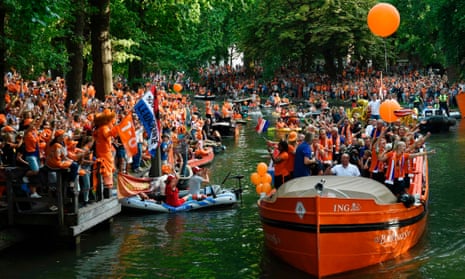The jubilant faces of the newly crowned European champions were splashed across the front of almost every major Dutch newspaper – regional and national – on Monday. “Undefeated champions,” De Volkskrant proudly boasted. “FENOMENAAL” was Algemeen Dagblad’s summary.
It has been a remarkable rise for the women in orange, who made their first appearance at a World Cup finals only in 2015 but have now reached the continental summit, putting an end to Germany’s 22-year-monopoly of the European crown.
Eight out of 10 people in the Netherlands watched the final on Sunday, a staggering statistic. The official figures say around 4.1 million people in the country watched the final, peaking at 5.5 million with the official coronation beckoning and Vivianne Miedema, scorer of two goals in the 4-2 win against Denmark, already in tears.
It has not been an easy journey for the team, which makes their triumph even more impressive. The Oranje Vrouwen’s performance at the World Cup in Canada under Roger Reijners had been lacklustre, with a safety-first approach curbing the players’ creative talents. Arjan van der Laan, Reijners’ successor, was dismissed in December 2016 and there may have been reason to panic. Six months away from a home European Championship the team had lost four out of five friendly matches, morale was low and there did not seem to be a good balance in the side.
That is when Sarina Wiegman got her chance, first on an interim basis and then permanently. The 47-year-old had been the assistant and already built up a decade’s worth of coaching experience. And so she set about changing the team’s mentality and the playing style.
There is no question the Dutch were worthy winners of Euro 2017, playing the best football over the three weeks. The confidence they showed in their own style was remarkable and definitely to Wiegman’s credit. The contrast to the World Cup has been stark, even though seven players who started on Sunday also started their last-16 game against Japan in Canada, a 2-1 defeat.
The team’s style has centred on principles of open, attacking football with flair and creativity as well as intelligent use of space – the kind of tactical precepts associated with the glory days of men’s Dutch football.
The optimism among the players and their willingness to adapt during matches at Euro 2017 were markers of their improvement. When Sweden suffocated the Dutch midfield, the defenders began to play longer passes to Miedema and Lieke Martens in attack. When Martens was marked out of the game against England, Danielle van de Donk pulled the strings in attack, and Shanice van de Sanden exploited the space on the opposite flank.
On Sunday, in a dressing room where Wiegman had been dunked in the shower and the country’s prime minister sprayed with champagne, the Dutch players danced to their own rendition of John de Bever’s Jij Krijgt Die Lach Niet Van Mijn Gezicht (You won’t take the smile off my face). The fact the Oranje Vrouwen emerged triumphant having played the best football put a smile on fans’ faces. There is now a generation of girls and boys not only in the Netherlands but around Europe, who will have reference points in women’s football as well as the men’s game. They can grow up dreaming of scoring like Miedema, dribbling like Martens and pulling off a save like Sari van Veenendaal.
One of the reasons for the success is that the KNVB (the Royal Dutch Football Association) now comprises people who come from a variety of sports. The general manager of women’s football is Minke Booij, a former hockey world player of the year who won everything from a European Championship in 1999 to an Olympic medal in 2008. The performance and innovation manager, Peter Blangé, was part of a gold-medal winning volleyball side at the 1996 Olympics. Before Euro 2017 the KNVB announced that a team at Leiden University would collaborate during Euro 2017 to provide analytical insights through data and statistics for the women’s team.
Wiegman’s own staff also combines the experience of the 74-year-old Heerenveen cult hero Foppe de Haan, as well as the energy and modern-day thinking of 31-year-old Arjan Veurink, who led FC Twente Vrouwen to BeNeLeague titles and qualification for the Champions League.
Rinus Michels, the only other coach to lead a Holland team to a European Championship, said in his book Teambuilding: “The trainer has three different elements at his disposal: the quality of the players in his squad, the match mentality of those players and the team-building mechanism.”
All three elements contributed to the Dutch success. Over recent years investing in national talent centres and establishing the women’s Eredivisie has meant that there is now a level of talent in the national team that might even merit being called a golden generation.
Apart from the defender Anouk Dekker, who is 30, most of the starting XI are in their early to mid-20s and should get even better. In Wiegman the Dutch have a coach with a winner’s mentality but also an extremely qualified professional who is open to ideas from new and various sources.
“It’s great that a team other than Germany have won the competition,” she said after the final. “It shows that the levels across the women’s game are that much higher now. I’m not even sure that we will definitely qualify for the World Cup; the competition is that strong now.”
World Cup qualification is, of course, still not assured but after the way Wiegman’s “team-building” project has come together there is every reason for the Dutch to be upbeat. In fact, looking at the brilliant example set by the Dutch women in their progress, development and professionalism, there is every reason for women’s football to be optimistic.

Comments (…)
Sign in or create your Guardian account to join the discussion